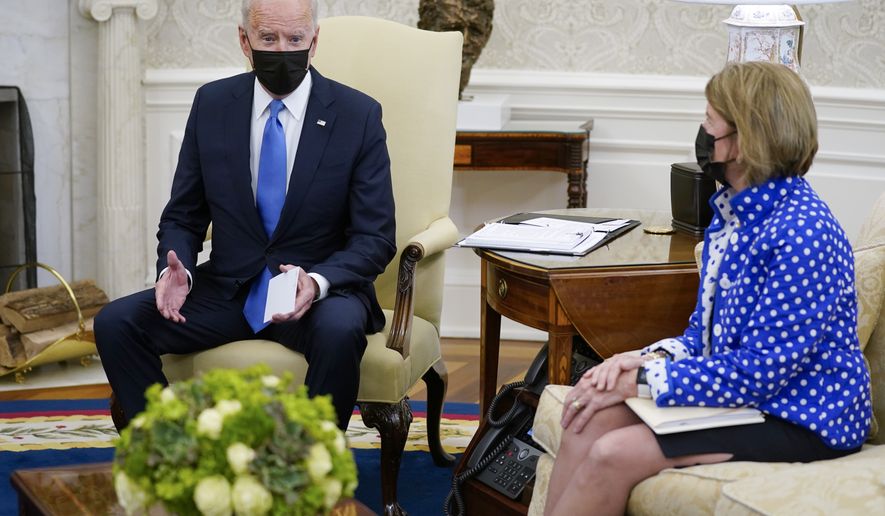The “tax gap,” or the difference between taxes owed and taxes paid, is emerging as one of the few conceivable ways to finance a big chunk of President Biden’s infrastructure priorities if both sides dig in on their “red lines” on taxes.
Mr. Biden and Republican senators said they had a productive talk at the White House Thursday, but the two parties have yet to find major common ground on how to finance the new infrastructure spending.
“We didn’t compromise on anything,” the president said from the Rose Garden after the meeting. “I laid out what I thought we should be doing, how it should be paid for, and my colleagues in the Senate came back and said they’ll come back to me with a counter-offer.”
Sen. Shelley Moore Capito of West Virginia, the leading Republican Senate negotiator, said the talk was a positive step.
“The attitude that the president had in the Oval Office with us was very supportive, very much desirous of striking a deal,” Ms. Capito said.
In addition to raising taxes, the president wants to beef up the IRS to go after tax cheats and suggested it’s an idea he can see Republicans supporting.
He said figuring out how to close the tax gap through stepped-up enforcement could generate between $700 billion and $1.3 trillion in revenue for the federal government
“Let’s say it’s somewhere in between. That’s a trillion dollars. I’m confident they would go for that,” the president told MSNBC this week.
House Speaker Nancy Pelosi also touted the idea after a Wednesday meeting at the White House with Mr. Biden, Senate Majority Leader Charles E. Schumer of New York, Senate Minority Leader Mitch McConnell of Kentucky and House Minority Leader Kevin McCarthy of California.
The White House estimates that the federal government could generate $700 billion in revenue over 10 years through an enforcement strategy that involves additional funding for the IRS and increased account flow reporting requirements for banks.
Democrats have long pitched closing the “tax gap” as a way to win money for other spending priorities.
Conservatives are wary of any plan that gives more power to the IRS and say the revenue estimates are overblown.
Sen. Mike Crapo of Idaho, the top Republican on the Senate Finance Committee, wrote to IRS Commissioner Charles Rettig this week asking for further clarification on Mr. Rettig’s past estimate that the annual tax gap could be as high as $1 trillion.
“What I am trying to do is establish a higher level of confidence of what that tax gap is and what it is composed of,” Mr. Crapo said ahead of Thursday’s meeting. “I am very willing to take reasonable steps to assure that those who owe taxes pay those taxes, but I don’t know what Nancy Pelosi’s specifics are on what or how.”
He said after the meeting that he was optimistic about how things are shaping up.
“That doesn’t mean that we will necessarily be able to make a deal happen, but we’re negotiating,” he said. “I think that’s a big thing.”
White House press secretary Jen Psaki said Thursday it’s too soon to talk about another spending package that is completely or partially deficit-financed.
“How to pay for it has long been the area where we need to find more common ground,” Ms. Psaki told reporters at the White House. “The president’s proposed a way to pay for it. We have not seen proposals that wouldn’t raise taxes on people making less than $400,000 a year. So if they feel that changing the 2017 tax law… is not the way to do it then we welcome what their alternatives are.”
Mr. McConnell had emerged from the Wednesday meeting to say that Republicans’ “red line” is touching the 2017 tax law, the signature legislative achievement of former President Trump and what were then GOP majorities in the House and Senate.
Mr. Biden wants to fund his $4 trillion-plus “jobs” and “families” plans by raising taxes on corporations and upper-income individuals that had been lowered by the 2017 law.
Later Wednesday, Mr. Biden downplayed talk of “user fees” to fund the package, which congressional Republicans have suggested.
“If everything is paid for by a user fee, well, then, you know, the burden falls on working-class folks who are having trouble,” the president said. “This has to be a burden shared across the spectrum.”
Senate Republicans, led by Ms. Capito, have introduced a $568 billion infrastructure counter-offer that includes $299 billion for roads and bridges, $35 billion for drinking water and wastewater, and $65 billion for broadband.
As possible pay-fors, the plan suggests repurposing unspent federal funds and ensuring that “all users of certain types of infrastructure,” such as drivers of electric cars, are contributing to the revenue stream.
• Haris Alic can be reached at halic@washingtontimes.com.
• David Sherfinski can be reached at dsherfinski@washingtontimes.com.




Please read our comment policy before commenting.